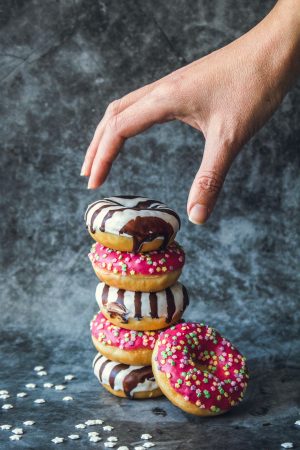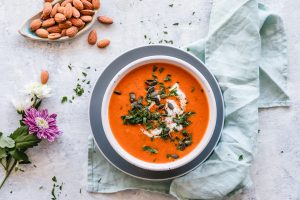The myth: Sugar is evil, it should be avoided at all costs and replaced with natural sweeteners.
Imagine a caveman. A stone aged hunter gatherer, struggling to survive after a long hard winter. It’s early spring and although there are plenty of flowers and blossoms, we are well and truly in the hunger gap and there is barely anything for our poor nomad to eat.
He emerges from a thicket and his eyes widen with delight and anticipation. They fall upon the most amazing sight of pure golden sunshine, growing from a bush. He has stumbled upon honey berries. Before he knows it his face is covered as sugary, unrefined juices gush from his lips, his mouth full to bursting.
Soon a wave of satisfaction flows through him as he gets a dopamine hit. For the moment he is content and already feeling a surge of energy that brings with it confidence and optimism. This is a natural sugar rush which will last long enough for him to catch and cook dinner, set up shelter and settle down for the night.

Just now I ate a jam donut. It was sickly sweet, and like the caveman I was soon covered in sugary juice. Like the caveman, my eyes lit up in delight and anticipation at the sight of the sweet treat and I soon devoured it.
Unlike the caveman, my sugary juice had been refined and processed in a factory. But did this mean it was any worse for me? If the myth is correct, and all sugar is bad then it doesn’t matter if it’s in a donut or honeyberries, if I eat too much I will get ill.
As we can see from the caveman analogy, sugar is obviously an essential part of our diet. It gives us a quick, instant burst of energy when we most need it and it can be stored as glycogen or fat for use later. But what exactly is sugar and why has it been so vilified?
A quick read of wikipedia will tell you that Sugar is a generic term for sweet tasting soluble carbohydrates and that table sugar refers to sucrose which is composed of fructose and glucose. It goes on to explain that sugars are found in almost all plant tissue and that honey and fruit are abundant sources of free flowing simple sugars. But what does all this mean and why would something so natural and essential be so bad for you?
What Wikipedia fails to tell you is that sugars are miracles of nature. Each berry that the caveman ate was a capsule of sunshine in biochemical form. When the caveman eats the berries he is consuming simple sugars entwined in fiber that not only fill him up, meaning that he is less likely to overeat, but also slow down his metabolism as energy is released slowly.
When I ate my donut the refined sugar had no fiber to cling to and was therefore absorbed very quickly. My blood sugar level skyrocketed and my insulin surged. I experienced a sugar rush, quickly followed by a crash as the fuel burns out (I can really feel it, maybe I should have had an apple instead).

If my blood sugar levels remain high and I consume more sugar it can be turned to fat which in time will lead to obesity; which, according to the NHS, is putting me at risk of heart disease, diabetes and cancer amongst others.
So, unrefined sugar (sugars that have gone through minimal processing, i.e. raw cane sugar, molasses, honey or those found naturally in fruit and veg) is fine, eat as much as you like, and refined sugar is bad. Not quite. Once the sugar reaches your bloodstream it doesn’t matter it’s origin. If there is too much of it it will be stored as fat.
But what about sugar alternatives? Natural and artificial sweeteners. What are they and are they better for you than refined cane or beet sugar? To understand this we need to understand a bit about how sugar is made. Conventional ‘table’ sugar is made from one of two plants.
Sugarcane is grown in tropical and subtropical regions such as the caribbean, Southern USA and Africa, whilst sugar beet favours a temperate climate such as the UK and Northern USA. Both are sliced or pulped, juiced, purified/filtered and concentrated into a syrup before being refined further into sugar.

Cane and Beet are used because they are both naturally high in sucrose and easy crops to grow, but the process can be applied to virtually any fruit juice, nectar, honey, molasses, maple syrup or even organic coconuts. The product that results from this process is sugar, even if it is labeled natural sweetener. After all, what is sucrose refined from sugar cane if not a natural sweetener?
Artificial sweeteners like saccharin or cyclamate are not sugars and have zero calories and yet can be up to 400 times sweeter than sucrose. They don’t contribute to tooth decay, obesity or diabetes and there is no sound evidence that they can cause cancer. They do, however taste (in my opinion) rank and recipes must be adapted to compensate for the significantly lower quantity needed, which is often more trouble than it’s worth.
So what have we learned? Have we busted the myth? All sugar is indeed bad for you if consumed in too large quantities, regardless of how refined, however unrefined sugars are metabolised slowly and less likely to lead to obesity and its related illnesses when consumed as part of a balanced diet and active lifestyle.

Refined sugar consumption should be kept to a minimum (NHS guidelines say 7 sugar cubes a day for an adult) and it is important to remember that many so called sugar alternatives and natural sweeteners are actually just sugar in disguise. Going for these options should be a matter of taste rather than health.
This is all very well, but reducing refined sugar in your diet can be quite a struggle, especially in today's world of supermarkets, processed food and sweets.
Processed food can hide a considerable amount of sugar. For example, a single cup of low fat yoghurt can contain over 45g of sugar, which is roughly eleven sugar cubes, (a huge amount considering the NHS guidelines suggest only 7). Another example is premade soup. Heinz tomato soup has 5 sugar cubes per can (a bowl of Frosties only has 4).
This is because salt is used as a preserving agent, and sugar counters the saltiness whilst also extending shelf life. By cooking from scratch you are in control of both the volume and type of sugar used. Why not try our Wild Garlic Butter or Dandelion Recipes?

We expect there to be sugar in sweets, however the behavior engineered by supermarkets trains us at a young age to desire these sweet treats. Sweets are usually positioned at a child's eye level as you finish your shop in the supermarket, creating both temptation and urgency.
Recently Imogen was on a shopping trip with our three year old, Xanthȇ, trying her hardest to rush past these low hanging ‘fruits’ before they were noticed. Obviously this plan didn’t work and what ensued was a 45 minute war over Kinder eggs (don’t get me started on the stupid plastic toys!).
Luckily Imogen was prepared to stand her ground, letting her have her tantrum, as Xanthe felt frustrated that she couldnt have her own way. Imogen sat with her as she writhed and screamed and didnt feel embaraassed!
Quite a sight, I can tell you. Strangers telling her to just give in and buy the bloody egg spurred her on, making her more resolved to not give in. Eventually Imogen won, Kinder lost and Xanthȇ forgot all about it within one minute and off they went hand in hand. Most importantly she hasn't asked again.
Luckily for us this isn’t a problem we have to deal with often. Supermarket shops are few, instead we tend to buy local in places like Jim’s Family Butcher in Whitstable and The Goods Shed in Canterbury.
Xanthȇ is just as likely to have a tantrum about not getting broccoli from a petrol station as sweets from a supermarket, although the fairy Nanny Plum does occasionally magic some chocolate into Xanthȇ’s secret stash, but only when her room is tidy, and she’s been extra good.
Have you had any sugar related ‘incidents’ with your little ones? If so, how have you resolved or avoided them? Do let us know in the comments below.
What ever you do don’t eat sugar after a day on the slopes
Sports drinks can be used in an inappropriate way I. E. Not after sport. Anytime because they are nice.
Snacks are usually made from sugar, fat and salt the three things we crave.
Thank you for this article to help us reflect on the consumption of refined foods.
Homemade foods and pudding are so good and the food is fantastic. One can be cautious about the content in full knowledge of what’s in it.
[…] Want to read more first? Why not read our Co Founders blog dunbunking outrageous myths about sugar? Or find out the shocking truth about Supermarket honey by our in house sustainability expert […]
[…] to read more first? Why not read our Co Founders blog dunbunking outrageous myths about sugar? Or find out the shocking truth about Supermarket honey by our in house sustainability […]
[…] at the sugar frenzy seen in Britain when rations finally ended, it’s a little easier to understand Edmunds Overwhelm […]